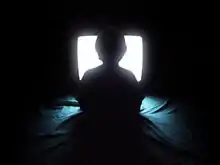Television addiction
Television addiction is a proposed addiction model associated with maladaptive or compulsive behavior associated with watching television programming. The most recent medical review on this model concluded that pathological television watching behavior may constitute a true behavioral addiction, but indicated that much more research on this topic is needed to demonstrate this.[1][2] The compulsion can be extremely difficult to control in many cases. The television addiction model has parallels to other forms of behavioral addiction,[2][3] such as addiction to drugs or gambling, which are also forms of compulsive behavior.

A child watching television
Television addiction is not a diagnosable condition of DSM-IV.[4]
References
- Sussman S, Moran MB (2013). "Hidden addiction: Television". J Behav Addict. 2 (3): 125–32. doi:10.1556/jba.2.2013.008. PMC 4114517. PMID 25083294.
- Sweet, Anne (2017). "Dependence in / on TV series II (Séries et dépendance: Dépendance aux séries II)". InMedia. 6.
- Sweet, Anne (2018). "Hooked on "Orange is the New Black" (Netflix, 2013-)? The Art of Binge-Watching, and Netflix's Addiction-Creating Production Strategies" in "Combining Aesthetic and Psychological Approaches to TV Series Addiction". Cambridge Scholars. ISBN 9781527514492.
- McIlwraith, Robert. ""I', addicted to television": the personality, imagination, and TV watching patterns of self-identified TV addicts". www.bnet.com. Retrieved 17 September 2011.
External links
This article is issued from Wikipedia. The text is licensed under Creative Commons - Attribution - Sharealike. Additional terms may apply for the media files.